Hibiscus tea is a vibrant, ruby-red herbal drink known for lowering blood pressure, supporting heart health, and promoting overall wellness.
Made from the dried petals of Hibiscus sabdariffa, this tart, cranberry-like infusion is packed with powerful antioxidants such as anthocyanins and vitamin C — compounds that help protect your cells from oxidative stress and inflammation.
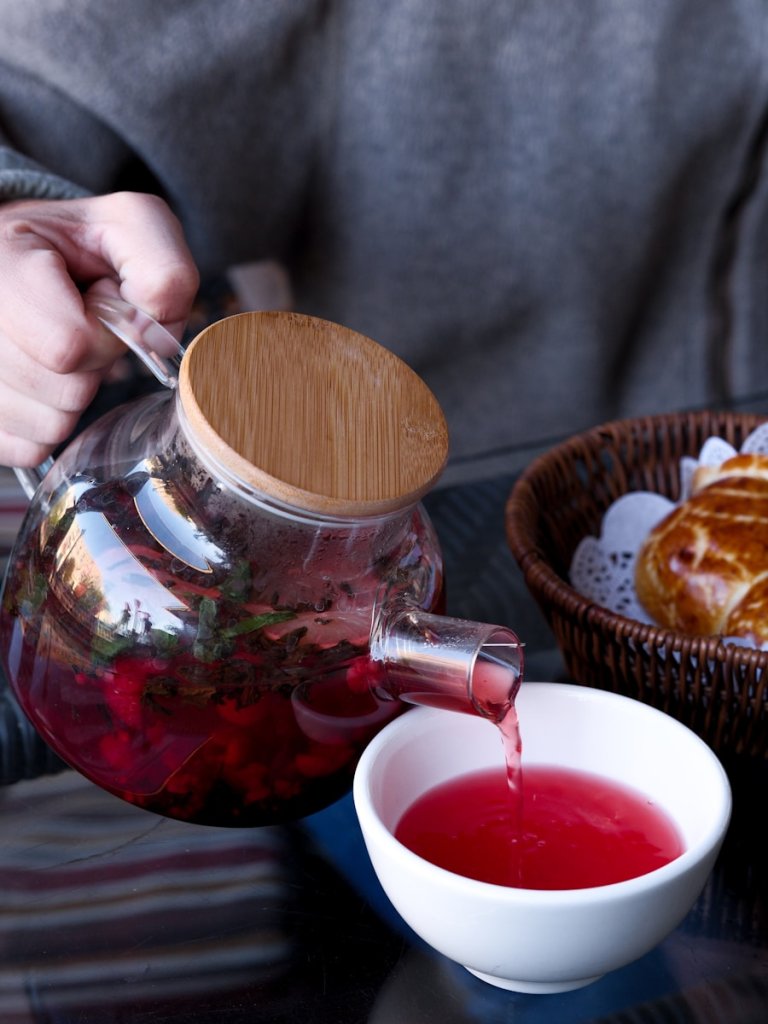
Understanding the benefits of hibiscus tea is important because it’s not just a soothing beverage — it’s a science-backed natural remedy used for centuries in both traditional and modern medicine. From regulating cholesterol and blood sugar to aiding weight loss and improving skin health, hibiscus tea offers a broad spectrum of wellness advantages.
It’s also caffeine-free, low in calories, and easy to prepare, making it a perfect daily drink for anyone seeking a natural way to support cardiovascular, metabolic, and immune function.
In this guide, you’ll learn the top 10 proven health benefits of hibiscus tea, along with safe dosage tips, preparation methods, and expert-approved precautions — all based on current research from credible sources like the Cleveland Clinic, Harvard Health Publishing, and the National Center for Complementary and Integrative Health (NCCIH).
🌸 Ready to brew your way to better health? Let’s explore how hibiscus tea can rejuvenate your body — one sip at a time.
What Is Hibiscus Tea?
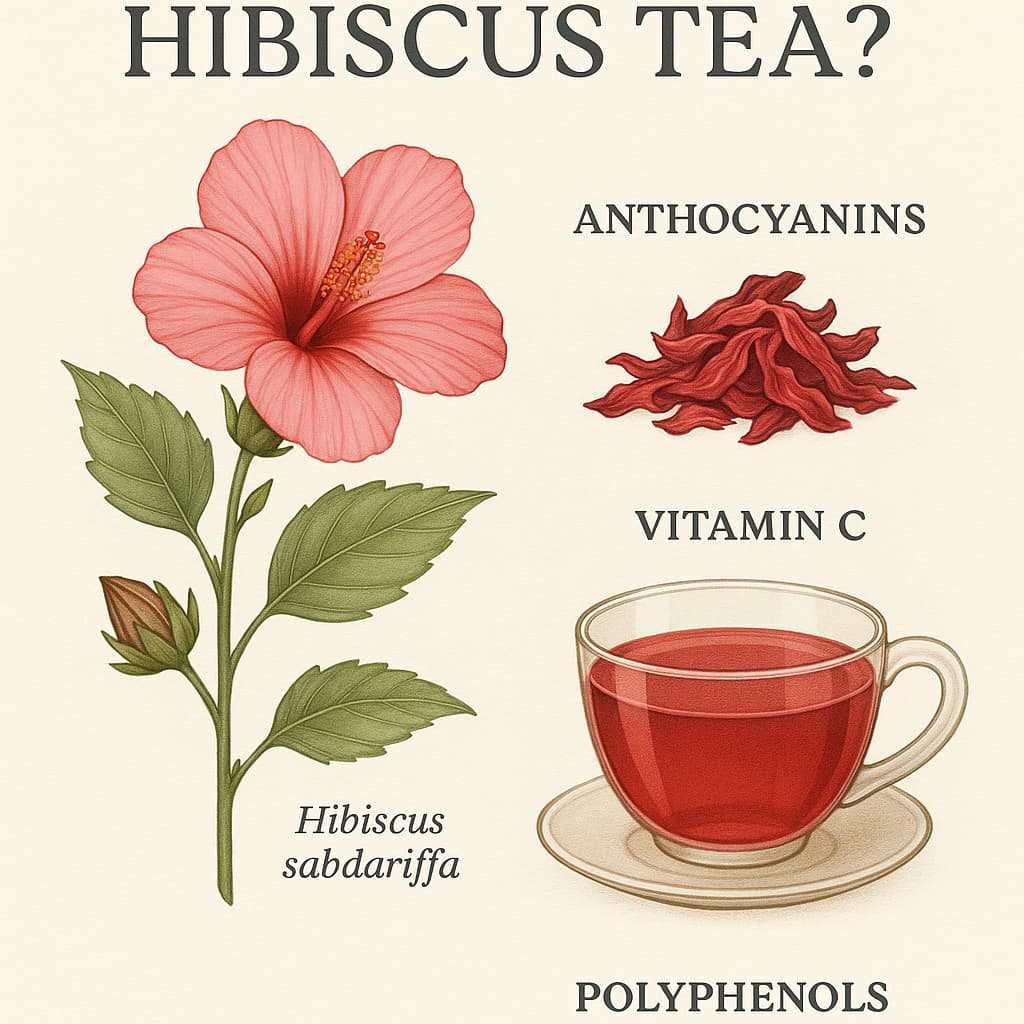
Hibiscus tea is made from the dried calyces (flower petals) of the Hibiscus sabdariffa plant, a tropical species native to Africa and widely grown in Asia and the Caribbean.
It has a tart, cranberry-like flavor and a striking ruby color. Unlike green or black tea, hibiscus tea contains no caffeine, making it perfect for hydration and relaxation.
Key Nutrients in Hibiscus Tea:
- Anthocyanins (natural antioxidants that give the red pigment)
- Vitamin C and beta-carotene
- Polyphenols and flavonoids
- Trace minerals like calcium, magnesium, and iron
Why Hibiscus Tea Matters for Your Health
Hibiscus tea is good for you because it supports heart health, lowers blood pressure, boosts metabolism, and provides a powerful dose of antioxidants — all naturally.
Understanding why hibiscus tea matters helps you see it not just as a colorful herbal drink, but as a science-backed functional beverage with real health potential. Its unique composition of anthocyanins, polyphenols, and vitamin C gives it wide-ranging protective effects throughout the body.
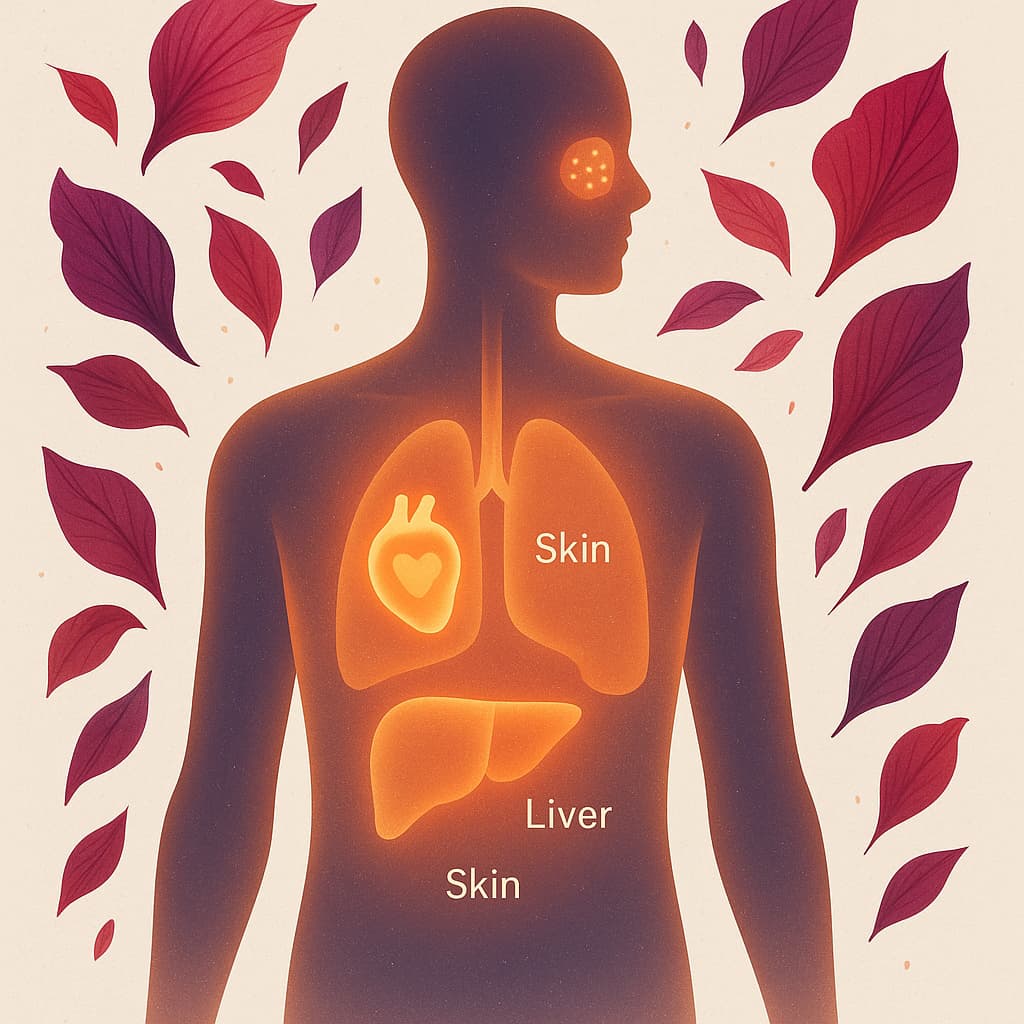
Key Reasons Hibiscus Tea Deserves a Place in Your Routine
- Cardiovascular support: Studies show hibiscus tea can lower both blood pressure and LDL cholesterol, helping protect your heart and arteries.
- Antioxidant powerhouse: Its red pigments are rich in anthocyanins — natural compounds that neutralize harmful free radicals and reduce oxidative stress.
- Metabolic balance: Hibiscus helps regulate blood sugar and fat metabolism, which may assist in healthy weight management.
- Liver and kidney protection: Research from the Cleveland Clinic notes its potential to aid detoxification and maintain organ health.
- Skin and immune benefits: The vitamin C and flavonoids in hibiscus strengthen immune defenses and support healthy, glowing skin.
What makes hibiscus tea special is that it delivers these benefits without caffeine, artificial additives, or excess calories — making it suitable for daily use by almost anyone.
As highlighted by Harvard Health Publishing, herbal teas like hibiscus can be a simple, enjoyable way to improve long-term wellness.
10 Proven Health Benefits of Hibiscus Tea
1. Lowers High Blood Pressure Naturally
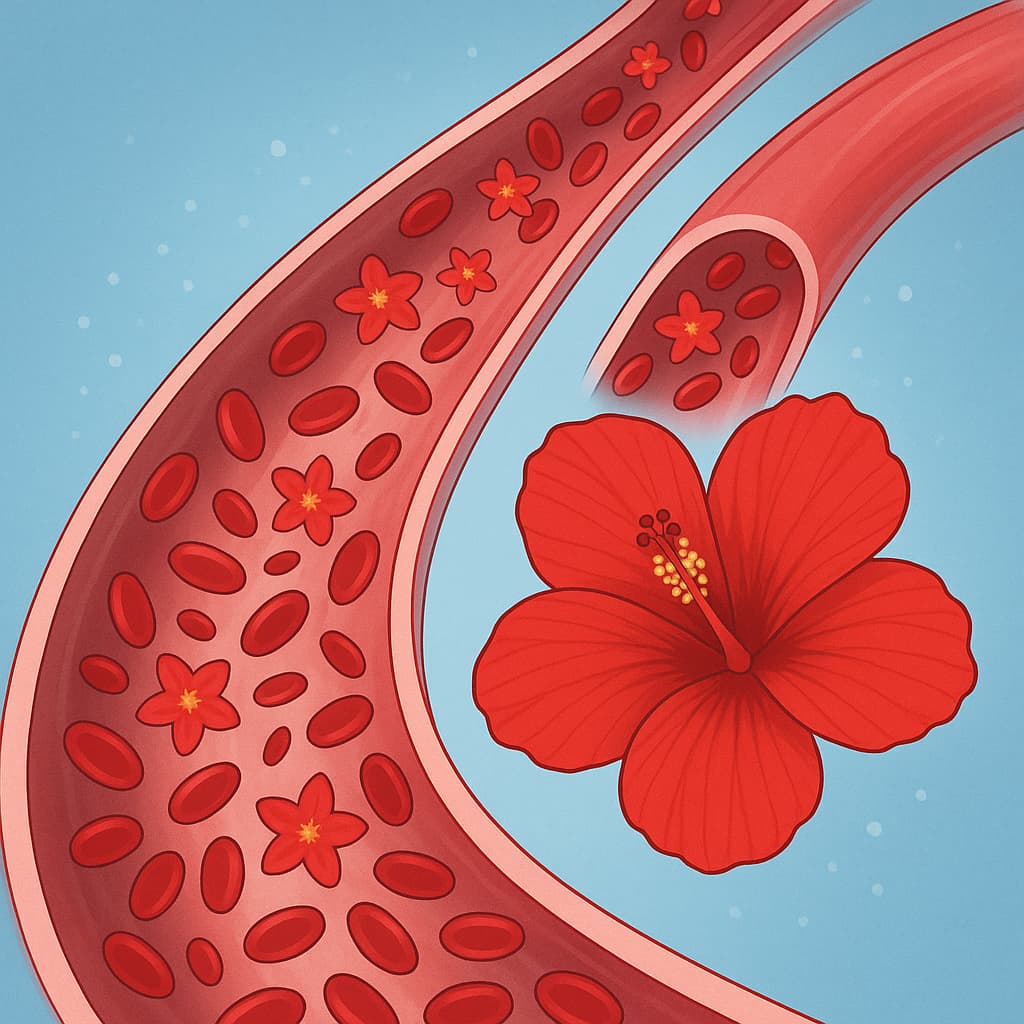
One of the most scientifically supported benefits of hibiscus tea is its ability to lower high blood pressure naturally.
According to the National Center for Complementary and Integrative Health (NCCIH, 2024), certain herbal teas — including Hibiscus sabdariffa — may help modestly reduce blood pressure levels in adults with mild hypertension when used as part of a healthy lifestyle. However, hibiscus tea should complement, not replace, prescribed medication or medical care.
The blood pressure–lowering effects of hibiscus come from its rich anthocyanins and phenolic acids, which act as natural vasodilators. These compounds help relax the smooth muscles of blood vessels, improving circulation and reducing vascular resistance.
Clinical studies published in Phytomedicine and The Journal of Nutrition have shown that people who drank hibiscus tea daily for six weeks experienced significant reductions in both systolic and diastolic blood pressure compared to placebo. The average systolic drop was 7–8%, indicating measurable cardiovascular support without the side effects seen in conventional antihypertensive drugs.
(NIH PubMed Central – Hibiscus sabdariffa and Blood Pressure Study)
Tip: Drinking 2–3 cups of hibiscus tea daily can help maintain healthy blood pressure levels naturally — especially when combined with a low-sodium diet, regular physical activity, and adequate hydration.
⚕️ Medical Note: If you take medication for blood pressure or have a cardiovascular condition, consult your healthcare provider before consuming hibiscus tea regularly, as it may enhance the effects of antihypertensive drugs.
2. Supports Healthy Cholesterol Levels
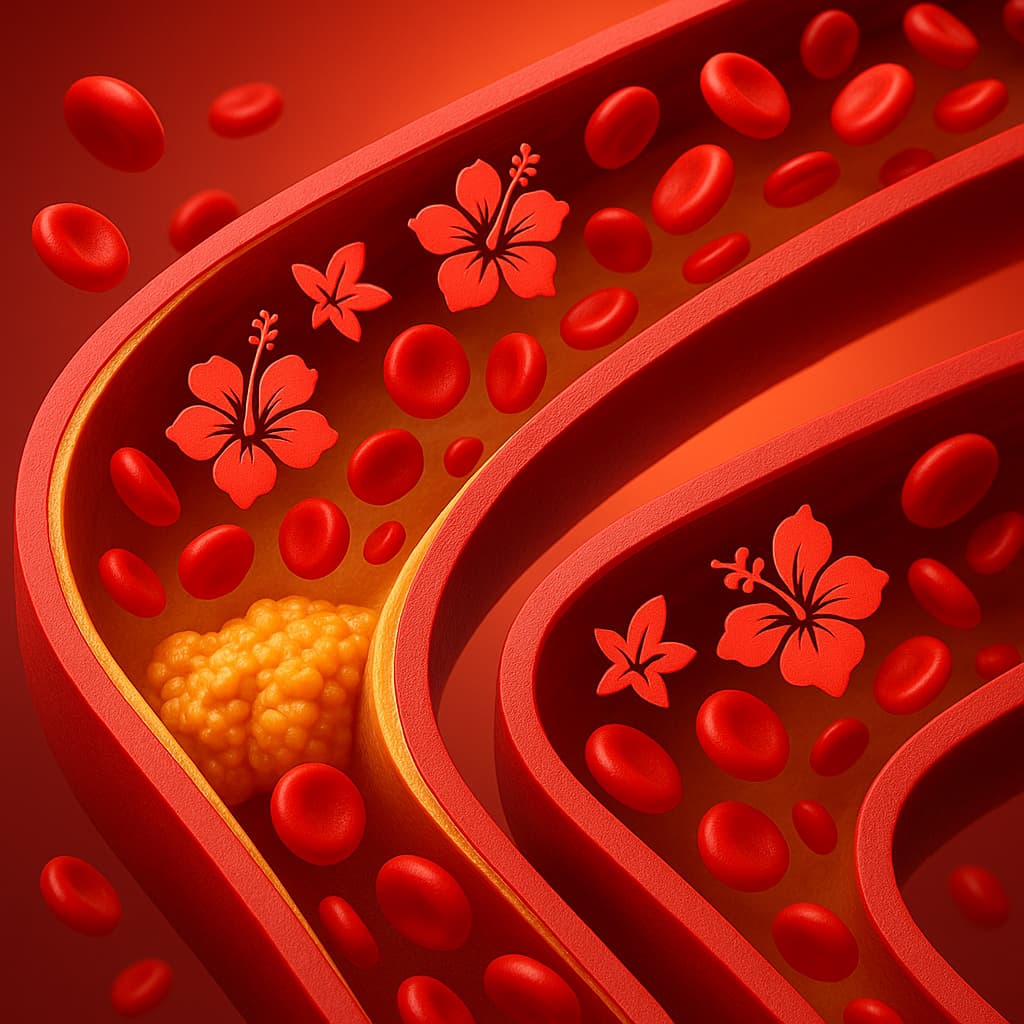
Research published in Phytomedicine (2023) found that hibiscus extract can lower LDL (“bad”) cholesterol and triglycerides, while raising HDL (“good”) cholesterol.
These effects help reduce plaque buildup in arteries, lowering the risk of heart disease.
According to Harvard Health Publishing, hibiscus tea’s rich anthocyanins and flavonoids help improve lipid profiles and prevent oxidative damage to blood lipids — a key factor in cardiovascular disease prevention.
Quick Tip: Pair hibiscus tea with heart-healthy foods like oatmeal, avocados, and olive oil for maximum cholesterol benefits.
3. Promotes Weight Loss and Fat Metabolism

Hibiscus tea is gaining attention for its potential to support weight management.
A 2022 study in the Journal of Ethnopharmacology found that hibiscus extract reduced body fat percentage, BMI, and waist-to-hip ratio in overweight individuals.
The tea works by inhibiting amylase, the enzyme responsible for breaking down starches into sugars, thereby reducing carbohydrate absorption and helping regulate post-meal blood sugar spikes.
🍵 Drink it before meals to promote satiety, curb cravings, and support healthy metabolism alongside regular exercise.
4. Boosts Liver Health
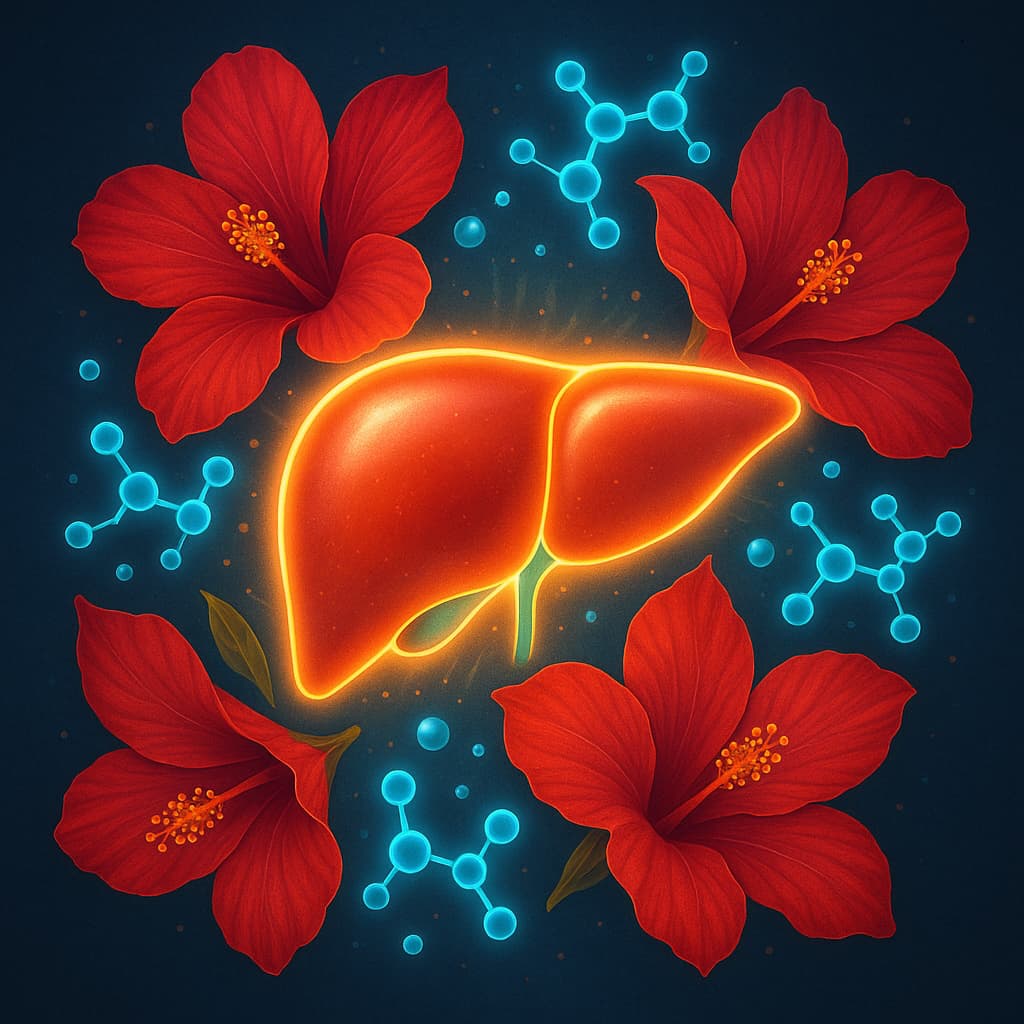
The liver plays a vital role in detoxifying the body, and hibiscus tea may help protect liver cells from oxidative stress.
A clinical study published by the Cleveland Clinic (2024) noted that hibiscus polyphenols enhance liver enzyme function (ALT and AST) and may prevent fat accumulation in the liver — a common issue linked to obesity and metabolic syndrome.
Animal and human trials suggest hibiscus may stimulate the liver’s antioxidant defenses, reducing damage caused by toxins and free radicals.
Good to know: Drinking hibiscus tea regularly can complement liver-friendly habits such as avoiding alcohol and maintaining a balanced diet.
5. Rich in Antioxidants
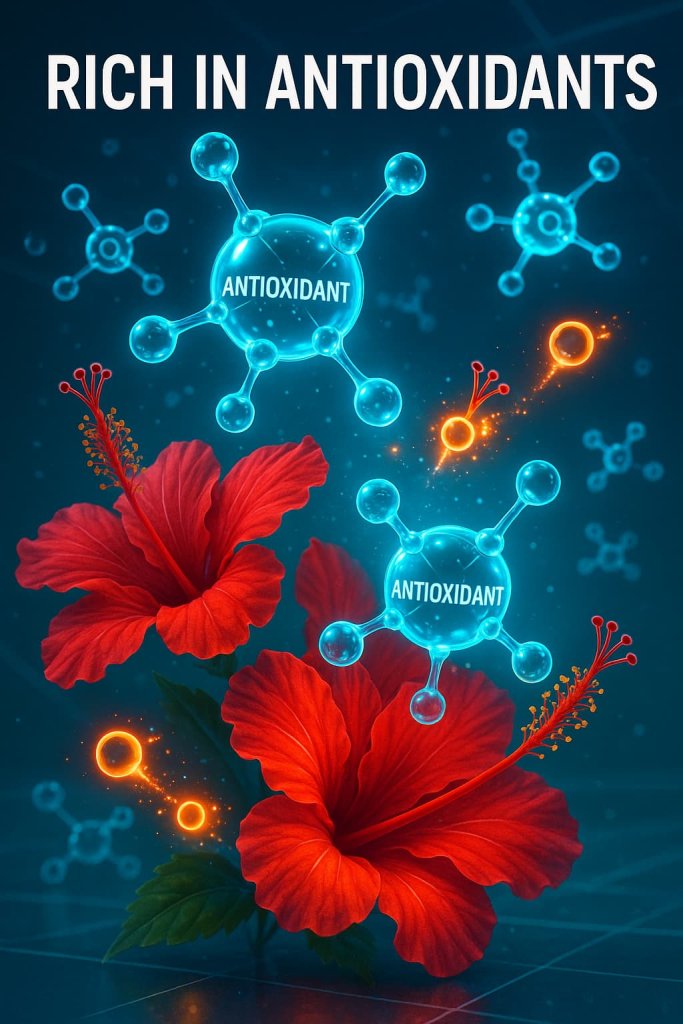
Hibiscus tea is packed with antioxidants, especially anthocyanins, flavonoids, and vitamin C, which combat oxidative stress and protect your cells from damage.
These compounds help reduce inflammation, slow down the effects of aging, and support a stronger immune system.
According to WebMD (2024), antioxidants in hibiscus may also protect against chronic diseases like cancer, diabetes, and neurodegenerative disorders.
💡 Fun Fact: The deep red color of hibiscus tea comes from anthocyanins — the same antioxidant pigments found in blueberries and cranberries.
6. Helps Regulate Blood Sugar
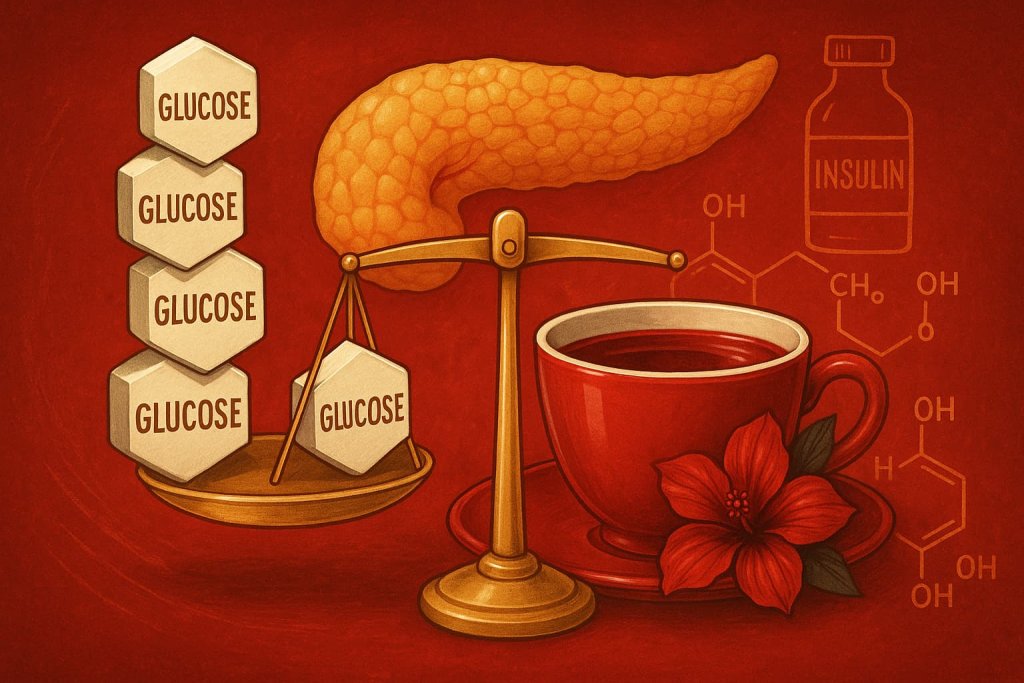
Hibiscus tea shows promising results in supporting healthy blood sugar levels.
Clinical research from PubMed Central (2023) indicates that regular consumption can reduce fasting glucose levels and improve insulin sensitivity in people with prediabetes or type 2 diabetes.
This is due to its high polyphenol content, which helps regulate carbohydrate metabolism and reduce inflammation in pancreatic cells.
Tip: Replace sugary drinks with chilled hibiscus tea for a refreshing, low-calorie way to manage glucose naturally.
7. Supports Heart and Circulatory Health
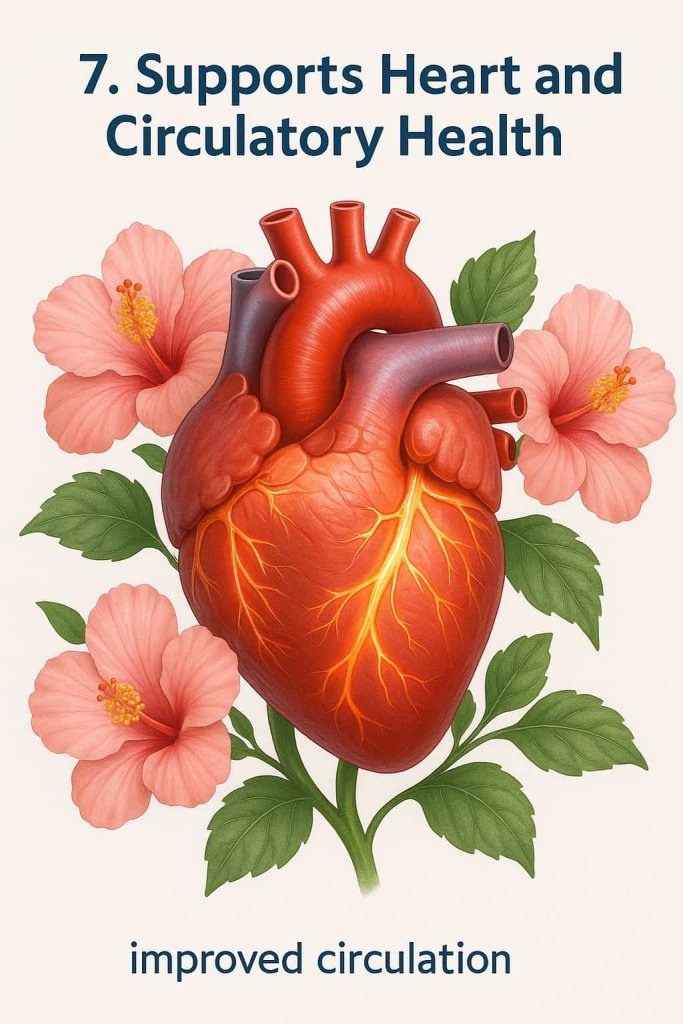
When combined, the blood pressure, cholesterol, and antioxidant effects of hibiscus tea contribute to overall cardiovascular wellness.
By improving lipid balance, promoting arterial elasticity, and reducing oxidative stress, hibiscus tea supports healthy circulation and reduces the risk of heart disease or stroke.
According to Cleveland Clinic, it’s one of the best herbal drinks for maintaining a healthy heart, especially in adults managing hypertension or high cholesterol.
8. Fights Inflammation and Bacterial Growth
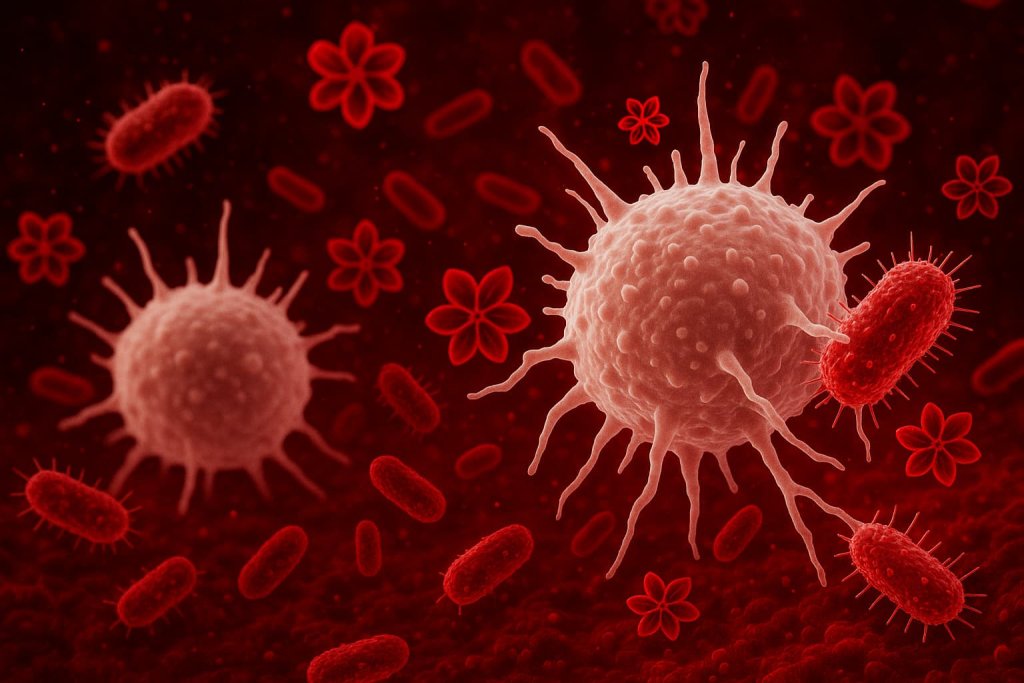
Hibiscus contains powerful anti-inflammatory and antibacterial compounds such as hibiscus acid and quercetin.
Studies have shown that hibiscus extract can inhibit harmful bacteria like E. coli and Staphylococcus aureus, helping the body’s natural immune defense.
Additionally, its anti-inflammatory properties may ease joint pain, sore throat, and muscle discomfort caused by oxidative stress.
🌸 Natural Remedy: Try warm hibiscus tea with honey and lemon for a soothing, antimicrobial drink during seasonal infections.
9. Enhances Skin and Hair Health

Hibiscus tea is a natural beauty enhancer.
It’s rich in vitamin C, alpha hydroxy acids (AHAs), and antioxidants that promote collagen synthesis and protect against UV damage.
This combination helps brighten skin tone, improve elasticity, and reduce fine lines.
For hair, hibiscus strengthens follicles and stimulates growth by improving scalp circulation.
According to Medical News Today (2024), hibiscus extracts are widely used in natural skincare and haircare due to their rejuvenating and moisturizing effects.
💁♀️ Beauty Tip: You can rinse your hair with cooled hibiscus tea for added shine and scalp nourishment.
10. Acts as a Natural Diuretic
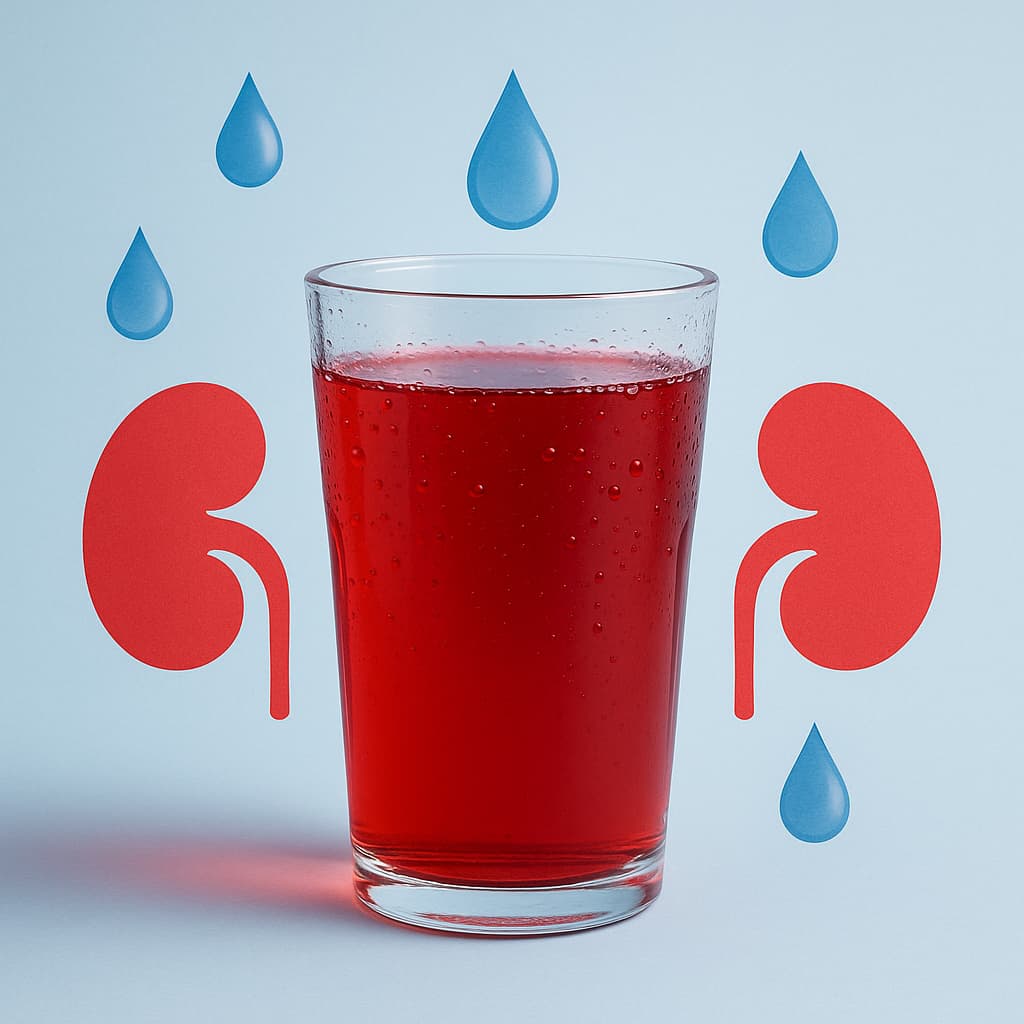
Hibiscus tea has mild diuretic properties, helping the body eliminate excess salt and water.
This supports kidney health, reduces bloating, and helps manage fluid retention — particularly in individuals with high blood pressure.
Its natural diuretic action, unlike pharmaceutical diuretics, doesn’t deplete potassium and maintains electrolyte balance.
This makes hibiscus a gentle, safe option for long-term hydration support.
🚰 Pro Tip: Replace one cup of regular tea or coffee with hibiscus tea daily to naturally support kidney function and reduce puffiness.
Recommended Dosage, Safety & Precautions
Understanding the right dosage and safety guidelines for hibiscus tea is essential to enjoy its health benefits while avoiding potential side effects or medication conflicts. Though hibiscus tea is generally considered safe for most adults, moderation is key — especially if you’re managing specific health conditions.
Recommended Daily Intake
For most healthy adults, drinking 2–3 cups (about 8–12 ounces each) of hibiscus tea per day is considered safe and beneficial. This moderate intake provides enough antioxidants and bioactive compounds to support blood pressure, cholesterol, and liver health without exceeding safe limits.
According to a 2024 review from the National Center for Complementary and Integrative Health (NCCIH) and findings published in the National Institutes of Health’s PubMed Central (PMC), most clinical trials on Hibiscus sabdariffa used 1.5 to 3 grams of dried hibiscus petals steeped daily to produce measurable cardiovascular and metabolic benefits. These studies typically lasted between 4–12 weeks and showed modest improvements in blood pressure and lipid levels.
How to Prepare Hibiscus Tea
- Add 1–2 teaspoons of dried hibiscus petals to 1 cup of boiling water (240 mL).
- Steep for 5–10 minutes, then strain and enjoy hot or chilled.
- To enhance flavor naturally, add lemon, cinnamon, or a small amount of honey — but avoid refined sugars to maintain its heart-healthy profile.
- For maximum antioxidant activity, avoid overboiling, as excessive heat can degrade anthocyanins (the key beneficial pigments).
🧠 Tip: For daily wellness, sip 1 cup in the morning and 1 cup later in the day. For those focusing on blood pressure support, research-backed results were achieved with 2–3 cups daily under medical supervision.
Safety Note:
If you are pregnant, breastfeeding, or taking antihypertensive or antidiabetic medications, consult your healthcare provider before consuming hibiscus tea regularly. Its mild blood pressure–lowering effect may enhance medication potency.
Who Should Avoid or Limit Hibiscus Tea
While hibiscus tea is safe for most people, certain groups should consult a healthcare professional before regular use:
- Pregnant or breastfeeding women – High concentrations of hibiscus may stimulate uterine contractions or affect hormone balance.
→ Refer to WebMD’s pregnancy advisory. - Individuals with low blood pressure (hypotension) – Hibiscus can further lower blood pressure, potentially leading to dizziness or fainting.
- People on medication for hypertension or diabetes – Hibiscus may enhance the effects of these drugs, requiring dosage adjustments.
- Those with kidney disorders – Because hibiscus is mildly diuretic, consult your doctor before long-term use.
- People with pollen or plant allergies – Rarely, hibiscus may cause mild allergic reactions such as skin irritation or sinus symptoms.
Potential Drug Interactions
While hibiscus tea is considered safe for most healthy adults, it may interact with certain prescription medications, altering how your body absorbs or metabolizes them.
According to the National Center for Complementary and Integrative Health (NCCIH, 2024), some herbs and dietary supplements can change how medicines work in the body. That’s why it’s important to tell your healthcare provider about any herbal teas or supplements you use — especially if you’re on long-term medication.
Below are some well-documented potential interactions related to Hibiscus sabdariffa:
• Antihypertensive Medications (e.g., lisinopril, captopril)
Hibiscus tea has mild blood pressure–lowering properties due to its anthocyanin content. When combined with prescription antihypertensive drugs, it may amplify their effects, leading to dizziness, fatigue, or low blood pressure (hypotension).
A pharmacokinetic study found that hibiscus extract altered the plasma concentration of captopril in hypertensive patients, suggesting a potential herb–drug interaction.
👉 NIH PubMed – Hibiscus and Captopril Interaction (2023)
• Antidiabetic Drugs (e.g., metformin, insulin)
Hibiscus tea can improve insulin sensitivity and lower blood glucose levels. While this may benefit blood sugar control, combining hibiscus with antidiabetic medications may cause hypoglycemia (blood sugar dropping too low).
👉 Verywell Health – Hibiscus Benefits and Side Effects (2024)
• Acetaminophen (Tylenol)
Animal and preliminary human studies indicate that hibiscus may influence liver enzyme activity, which could alter how the body metabolizes acetaminophen. This means that high or frequent hibiscus consumption might change drug clearance or reduce acetaminophen effectiveness.
👉 Drugs.com – Hibiscus Professional Monograph
• Diuretics (e.g., hydrochlorothiazide, furosemide)
Hibiscus tea has a natural diuretic effect, meaning it helps the body eliminate excess sodium and water through urine. This mild fluid-releasing property can be beneficial for reducing temporary water retention and supporting kidney function in healthy individuals.
However, when hibiscus tea is consumed alongside prescription diuretics such as hydrochlorothiazide or furosemide, it may amplify the medication’s effect, potentially leading to dehydration, low potassium (hypokalemia), or electrolyte imbalances. These effects are of particular concern for individuals with kidney disease, heart conditions, or blood pressure disorders.
A study published in the Journal of Ethnopharmacology found that Hibiscus sabdariffa extracts increased urinary volume and sodium excretion in animal models, confirming its diuretic potential. (PubMed – NIH, 2012)
More recent research in the MDPI Foods Journal (2024) highlighted hibiscus’s effect on renal function and electrolyte balance, noting that overconsumption may alter fluid homeostasis. (MDPI, 2024)
Medical Guidance: If you take diuretic medication or have a history of kidney or heart disease, speak with your healthcare provider before adding hibiscus tea to your routine. Combining natural and prescription diuretics can increase the risk of dehydration and mineral imbalance.
💡 Moderate consumption (1–2 cups daily) is generally safe for most healthy adults, but those on diuretics should only use hibiscus under medical supervision.
Safety Guidance:
If you are taking medication for blood pressure, diabetes, pain management, or kidney function, always consult your doctor or pharmacist before regularly consuming hibiscus tea. Your provider may need to adjust your dosage or monitor your blood levels to ensure safety.
💡 Hibiscus tea is safe for most adults when consumed in moderation. However, due to its biological activity, it should complement — not replace — prescribed treatments and professional medical care.
Safety Summary Table
| Group / Condition | Recommended Action | Notes |
|---|---|---|
| Healthy adults | ✅ 2–3 cups/day | Safe and beneficial |
| Pregnant women | ⚠️ Avoid | May stimulate uterus |
| Low blood pressure | ⚠️ Limit | Can lower BP further |
| Diabetes medication users | ⚠️ Monitor glucose | May increase insulin sensitivity |
| Hypertension medication users | ⚠️ Monitor BP | May amplify drug effects |
| Kidney disorders | ⚠️ Consult doctor | Has diuretic properties |
Storage & Quality Tips
- Store dried hibiscus petals in an airtight glass jar, away from sunlight and humidity.
- Use organic, pesticide-free hibiscus from verified brands for purity and safety.
- Always check for discoloration, mold, or damp odor before brewing — these are signs the product has spoiled.
✅ Bottom Line
Hibiscus tea is safe, natural, and beneficial when enjoyed in moderation.
However, because it can influence blood pressure, blood sugar, and drug metabolism, it’s best to discuss regular consumption with your healthcare provider — particularly if you have chronic conditions or take medication.
For detailed safety profiles, you can refer to: WebMD: Hibiscus Tea Safety Facts (2024)
Frequently Asked Questions (FAQ)
1. Can hibiscus tea help with weight loss?
Yes. Several studies — including a 2022 report in the Journal of Ethnopharmacology — found that hibiscus extract may help reduce body fat and improve metabolism. It works by blocking starch absorption and regulating lipid levels, which can support healthy weight management when paired with a balanced diet and exercise.
2. Is hibiscus tea safe during pregnancy?
It’s best to avoid hibiscus tea during early pregnancy unless approved by your doctor. Research noted by WebMD warns that hibiscus can stimulate uterine contractions and affect hormone levels. If you’re pregnant or breastfeeding, always consult a healthcare professional before consuming herbal teas.
3. Can I drink hibiscus tea every day?
Yes, drinking 2–3 cups of hibiscus tea daily is considered safe for most healthy adults. Studies suggest regular consumption supports heart health, antioxidant balance, and healthy blood pressure levels. According to the National Center for Complementary and Integrative Health (NCCIH), hibiscus may help reduce blood pressure in people with mild hypertension. However, because it can amplify the effects of certain medications, such as those for blood pressure or diabetes, it’s best to consult your healthcare provider before drinking it daily.
4. Does hibiscus tea lower blood pressure?
Yes. Hibiscus tea is one of the most studied herbal remedies for naturally lowering blood pressure. Meta-analyses and clinical trials show it can reduce both systolic and diastolic blood pressure due to its vasodilatory and diuretic effects. However, if you’re already taking antihypertensive medications, consult your doctor before combining the two.
5. Does hibiscus tea have caffeine?
No — hibiscus tea is naturally caffeine-free, making it a great alternative to black or green tea. You can enjoy it hot or iced at any time of day without affecting sleep quality or heart rate.
6. Can hibiscus tea help regulate blood sugar?
Yes. Research summarized in PubMed Central (2023) found that hibiscus tea may lower fasting glucose and improve insulin sensitivity, especially in people with prediabetes or type 2 diabetes. It’s a healthy addition to a low-sugar diet.
7. What’s the best time to drink hibiscus tea?
You can drink hibiscus tea after meals to aid digestion or in the evening as a caffeine-free relaxation drink. Avoid taking it on an empty stomach if you have acid sensitivity, as its tartness can sometimes cause mild discomfort.
Bonus Tip
To maximize benefits, use organic dried hibiscus petals and avoid sweetened bottled versions — they often contain added sugars that cancel out many of the tea’s natural health advantages.
Conclusion
Hibiscus tea is more than a refreshing, ruby-red drink — it’s a powerhouse of natural healing.
Backed by science, it supports heart health, blood pressure balance, weight management, liver protection, and glowing skin — all without caffeine or chemicals.
Regularly drinking hibiscus tea can help you maintain better circulation, healthy cholesterol, and a stronger immune system, while providing a daily antioxidant boost that keeps your body resilient against stress and aging.
Whether you sip it hot in the morning or chilled in the afternoon, each cup delivers a gentle, evidence-based way to protect your long-term health.
👉 Start enjoying 1–2 cups of hibiscus tea daily for a natural boost to your heart, metabolism, and overall well-being — one sip at a time.
For maximum benefits, choose organic, unsweetened dried petals and consult your healthcare provider if you have existing medical conditions.
References
- Cleveland Clinic (2024). 7 Benefits of Hibiscus Tea.
— Reviewed by registered dietitians, this article highlights hibiscus tea’s impact on blood pressure, cholesterol, liver health, and antioxidant protection.
👉 https://health.clevelandclinic.org/benefits-of-hibiscus - Harvard Health Publishing (2023). The Health Benefits of 3 Herbal Teas.
— Explains hibiscus tea’s anthocyanin-rich composition and its proven role in lowering LDL cholesterol and improving cardiovascular health.
👉 https://www.health.harvard.edu/nutrition/the-health-benefits-of-3-herbal-teas - WebMD (2024). Hibiscus Tea: Is It Good for You?
— Provides a balanced overview of hibiscus tea’s health benefits, potential risks, and medication interactions.
👉 https://www.webmd.com/diet/hibiscus-tea-is-it-good-for-you
